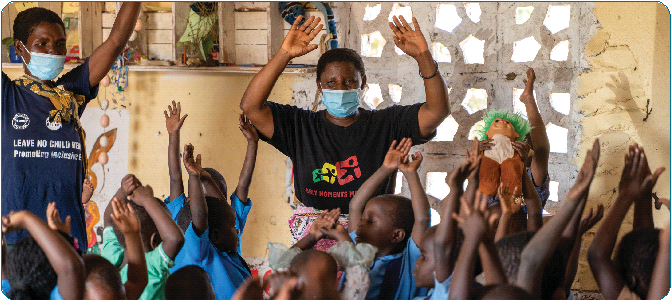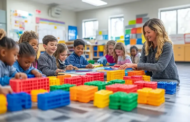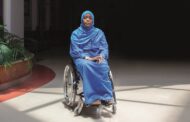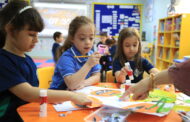By Sightsavers
When children are given the right support in pre-school, they are more likely to progress to primary school. This is especially true
for children with disabilities. Sightsavers works with more than 40 Community Based Childcare Centres (CBCCs) in Malawi to provide inclusive early childhood education. This article looks at the challenges during the COVID-19 pandemic and the steps taken to move forward.
Project context
Sightsavers and partners work with the CBCCs with financial support from People’s Postcode Lottery. As part of the three-year project, which began in 2020, young children with disabilities are being supported to attend pre-school where they can learn, play and develop alongside their peers.
Volunteer CBCC caregivers have been trained to adapt their teaching and play styles to support children with different needs. They have been encouraged to include all children in school activities, and now have greater
confidence in teaching children with disabilities.
Inclusive training materials such as flipcharts have been developed which include instructions for the facilitator and illustrations and guidance for participants. The materials are linked to the early years curriculum and make suggestions about producing appropriate play materials and using local resources, adapting activities so that all learners can be involved and working together to organize and manage classroom and outdoor spaces.
Cluster groups have been formed so that different center’s can learn from each other and CBCC caregivers are able to meet to discuss the challenges they face.
“The trainings that we went through were ‘inclusive education’ so that … all students will have equal learning opportunity regardless of their status… After getting trained, it helped me so much with these students …” (Marytina, teacher, Mkonde CBCC)
Learning interrupted
The three-year project was due to begin in April 2020, just as the COVID-19 pandemic was taking hold. With restrictions on meetings and school closures, normal teaching could not happen. The project staff switched to remote meetings as they were not able to make visits to CBCCs until October 2020.
The interruptions caused a lot of disturbance, especially for children with disabilities because of their greater support needs. We realised that children were not able to access learning materials so we started developing a set
of resources that parents of children with disabilities could use at home. As not all children can attend a CBCC, these materials give an outline of different activities that will support children’s learning.
“During COVID-19 our school temporarily closed but we still had a plan to get into class in fewer numbers… As caregivers, we were encouraging the parents to still give children toys knowing that a child learns a lot by playing. We went around visiting them in their homes, encouraging the parents that as the children play remind them that one of these days, they will get back to school and they should not forget the school materials.” (Marytina, teacher, Mkonde CBCC)
Changes made
Small changes were made when returning to the classroom. For safety, children now sit 1m apart, and all CBCCs have water available and encourage hand washing. As a precautionary measure, the duration of lessons and the length of the school day were shortened. This has been adopted in the longer term by the
Social impact
During COVID-19 there were many restrictions and few activities took place between families. Some homes experienced food shortages because local businesses shut down. There has been some weakening of relationships between CBCC caregivers, parents, and children as people lived in isolation during the height of the pandemic. But gradually things are returning to normal, parents can fetch food for their families, and people can visit each other and socialize.
In order to encourage learners back into schools, community awareness meetings were held and CBCC caregivers visited the homes of children who had not returned. But most parents, CBCC caregivers and children were excited to get back to schools.
“We’ve seen a high number of children with disabilities registering at the CBCCs, which was not the case before the project. We’ve also seen communities working together to support the families and the canters that are enrolling children with disabilities.
Parents of children with disabilities are taking a leading role in making sure they support their children’s education. Some parents travel long distances to bring their children to the community canters – before the project, this was not the case.” (Betty Moses, technical advisor for Sightsavers Malawi)
Supporting livelihoods
To increase the project’s sustainability, community gardens have been set up alongside the CBCCs. Children and their communities have learned about farming, and the gardens provide children with a nutritious porridge breakfast. With the support of agricultural workers, the families of children with disabilities have built enclosures for livestock and been supplied with goats. As
these give birth the scheme is extended to the next family. This provides additional income for the families. In one Centre enough food was produced to feed all the children for a year and to raise funds to buy some teaching materials.
Sightsavers is involved with a number of partners on this project, including the
Catholic Health Commission (Malawi), the Ministry of Gender Children Disability and Social Welfare (Ntcheu), and the Parents of Disabled Children Association in Malawi.
For more information: https://bit.ly/eer11-4
This article was written by members of the Sightsavers project team, including Betty Moses, Ben Chikaipa and Effie Kaminyoghe. For more details contact Ronnie Stapleton, Sightsavers’ Global Technical Lead for Education for the East Central & Southern Africa region: vstapleton@sightsavers.org
Reference
*Enabling Education Review
*Issue 11 – Education in the new normal December 2022














